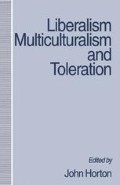Abstract
Philosophical reflection (Baier, 1986; Bok, 1978; Luhmann, 1979) agrees with commonsense observation on the pervasiveness of trust in human life. In complex societies, whether or not they are pluralist, two forms of trust seem to be widespread. There is trust in institutions, for instance money, the political process, as well as personal trust between individuals, for instance friends and colleagues. And as well as trust there is also distrust. These facts raise a number of questions: what is trust? how is it, for instance, connected to seemingly related notions like expectation and hope? how, if at all, are trust in institutions and personal trust connected? is it possible to distinguish between rational and pathological forms of trust, of both institutions and persons? how might trust of institutions and persons be created and maintained in a pluralist, multicultural society? is distrust always to be seen negatively? is there, for instance, a positive role for distrust in relation to institutions? what is the role of education in promoting trust (and perhaps distrust?) in institutions? can education make people trustworthy and also able rationally to assess when they should trust others?
Access this chapter
Tax calculation will be finalised at checkout
Purchases are for personal use only
Preview
Unable to display preview. Download preview PDF.
Bibliography
Baier, A. (1986) ‘Trust and Antitrust’, Ethics., vol. 96, 231–60.
Bok, S. (1978) Lying: Moral Choice in Public and Private Life. (Hassocks, Harvester Press).
Dunn, J. (1988) ‘Trust and Political Agency’, in D. Gambetta (ed.) Trust: Making and Breaking Cooperative Relations. (Oxford, Blackwell).
Luhmann, N. (1979) Trust and Power. (Chichester, Wiley).
Gambetta, D. (ed.) (1988) Trust: Making and Breaking Cooperative Relations. (Oxford, Blackwell).
Shklar, J. (1984) Ordinary Vices. (London, Harvard University Press).
Singer, Isaac Bashevis (1990) ‘A Peephole in the Gate’, in The Death of Methuselah. (Harmondsworth, Penguin).
Spiecker, B. (1990) ‘Forms of Trust in Education and Development’, Studies in Philosophy and Education., vol. 10, 2.
White, P. (1990) ‘Friendship and Education’, Journal of Philosophy of Education., vol. 24, no. 1.
White, P. (1991) ‘Hope, Confidence and Democracy’, Journal of Philosophy of Education., vol. 25, no. 2.
Williams, B. (1985) Ethics and the Limits of Philosophy. (London, Fontana).
Editor information
Editors and Affiliations
Copyright information
© 1993 Patricia White
About this chapter
Cite this chapter
White, P. (1993). Trust and Toleration: Some Issues for Education in a Multicultural Democratic Society. In: Horton, J. (eds) Liberalism, Multiculturalism and Toleration. Palgrave Macmillan, London. https://doi.org/10.1007/978-1-349-22887-4_5
Download citation
DOI: https://doi.org/10.1007/978-1-349-22887-4_5
Publisher Name: Palgrave Macmillan, London
Print ISBN: 978-1-349-22889-8
Online ISBN: 978-1-349-22887-4
eBook Packages: Palgrave Political & Intern. Studies CollectionPolitical Science and International Studies (R0)

